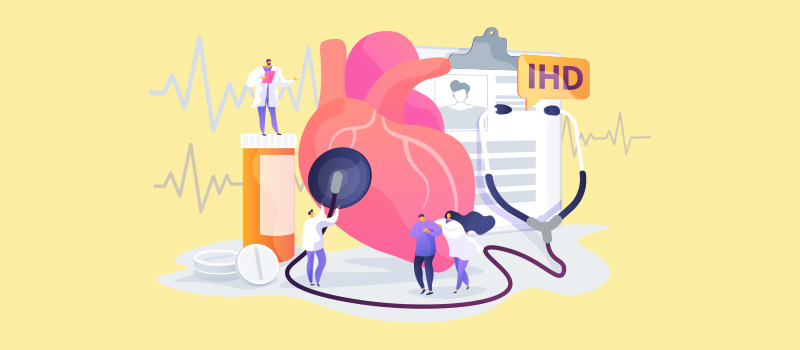What’s the Buzz
The Bee Healthy Blog
Is Afib Hereditary?

Atrial fibrillation (AFib) is a heart condition in which there is an irregular and fast heart rhythm or arrhythmia. Afib affects some 3 to 6 million Americans. It is expected that the numbers will rise to 6-16 million by 2050.
There are some common risk factors present in people with atrial fibrillation. However, some people can have this type of arrhythmia even in the absence of a risk factor called lone atrial fibrillation or lone AF. It suggests that genetic factors may be involved in the development of Afib.
Please continue reading to learn more about atrial fibrillation's causes and risk factors, including the genetic and environmental factors that play a role in its development.
What is Afib?
Atrial fibrillation (A-fib, AFib, or AF) is an arrhythmia (fast and irregular heartbeat) in which the upper chambers of the heart (called the atria) beat erratically and out of sync with the lower chambers (called the ventricles).
Afib itself is not life-threatening. However, people with this condition are at risk of developing blood clots in the heart. They are also at increased risk of stroke, heart failure, and other complications like sudden cardiac death. Atrial fibrillation is, therefore, a serious condition that needs to be treated.
Sometimes, atrial fibrillation can occur with another related heart rhythm abnormality called atrial flutter. Both atrial fibrillation and atrial flutter are different types of atrial arrhythmias with similar treatments.
What are the symptoms of atrial fibrillation?
Many people with atrial fibrillation don’t have any symptoms. However, the condition can cause palpitations (fast and irregular heartbeat), weakness, tiredness, lightheadedness, dizziness, chest pain, shortness of breath, and reduced ability to exercise. Some people have persistent afib symptoms, while the episodes come and go in others.
What are the causes of atrial fibrillation?
One of the most common causes of afib is structural heart disease or problems with the heart's structure, such as congenital heart defects (defects you’re born with) and problems with the heart valves.
Other possible causes of atrial fibrillation include high blood pressure, coronary artery disease, heart attack, problems with the heart’s natural pacemaker (sick sinus syndrome), previous heart surgery, and lung disease.
In some people, atrial fibrillation occurs without heart damage or heart problems. Due to illness or medical conditions like thyroid disease, sleep apnea, and viral infections, physical stress has been linked to atrial fibrillation. Certain medications and stimulants like alcohol and caffeine can also cause afib.
Who is most prone to AFib? What are the risk factors?
Some of the risk factors for atrial fibrillation (A-fib) include older age, structural heart disease, high blood pressure, thyroid disease, and chronic health conditions like diabetes mellitus, metabolic syndrome, sleep apnea, chronic kidney disease, and lung disease. Lifestyle risk factors of afib include drinking alcohol, especially binge drinking, and obesity. A family history of atrial fibrillation is also a risk factor.
Does atrial fibrillation run in families?
Yes, an inherited heart condition called familial atrial fibrillation or familial lone atrial fibrillation has been identified. It is believed that familial atrial fibrillation is caused by mutations (changes) in the atrial natriuretic peptide gene. However, familial atrial fibrillation is a genetically heterogeneous disorder, meaning that besides mutant atrial natriuretic peptides, there are other genes involved, all of which have not yet been identified.
Familial atrial fibrillation is often inherited in an autosomal dominant manner (one copy from one parent can cause the condition). However, autosomal recessive inheritance has also been reported (one copy of the mutated gene from each parent is required to cause the condition).
Will I get afib if there’s familial atrial fibrillation in my family?
The Framingham Offspring Study found that people who have one parent with a history of atrial fibrillation are at a 1.8 times higher risk of developing the condition themselves. Also, the risk is 3 times higher in people under 75 years.
The Mayo Clinic AF registry has found that 5% of all patients and 15% of patients with lone atrial fibrillation have a family history of the condition.
Therefore, parental atrial fibrillation or lone atrial fibrillation in your family increases your risk of developing the condition, but it is not guaranteed that afib will occur.
Genetic testing for familial atrial fibrillation is not usually performed because a universal genetic risk stratification method or AF genetic risk score is not yet available for use in clinical practice.
Can you live a long life with atrial fibrillation?
It is possible to live a long life with atrial fibrillation provided you get the appropriate treatment. Afib and familial atrial fibrillation are associated with an increased risk of serious complications. Blood clots and stroke are two of the most dangerous complications associated with atrial fibrillation. Therefore, you must follow your cardiovascular medicine doctor’s recommendations to keep afib under control.
Treatment for atrial fibrillation can include medications like blood thinners, cardioversion (procedures to reset the heart’s rhythm), and surgery or catheter procedures to block defective signals in the heart.
While many types of atrial fibrillation, including familial AF, may not be entirely preventable, you can reduce your risk of atrial fibrillation and its complications by following a heart-healthy lifestyle. This includes eating a healthy diet, exercising regularly, maintaining a healthy weight, not smoking, limiting alcohol and caffeine intake, and managing stress and anger.
References:












SOCIAL